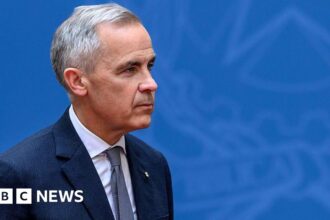In an unprecedented move that has sent ripples through Alberta’s political landscape, former Infrastructure Minister Prasad Panda has publicly released confidential cabinet documents, challenging Premier Danielle Smith’s United Conservative Party government to embrace greater transparency in its decision-making processes.
The dramatic revelation came during yesterday’s legislative session when Panda, now sitting as an independent MLA after being removed from cabinet, tabled a series of cabinet planning notes that offer rare insight into the inner workings of provincial governance. These documents, typically shielded from public scrutiny, detail policy discussions and strategic planning that occurred behind closed doors during his tenure.
“Albertans deserve to know what’s happening in their government,” Panda declared to a visibly stunned chamber. “When decisions affect millions of citizens and billions in taxpayer dollars, transparency shouldn’t be optional—it should be mandatory.“
The former minister’s actions have raised significant questions about cabinet confidentiality, a long-standing convention in Westminster parliamentary systems designed to encourage frank discussions among ministers. Legal experts suggest Panda may have crossed a constitutional line by releasing documents traditionally protected under executive privilege.
Premier Smith’s office responded swiftly, issuing a statement that characterized the disclosure as “a concerning breach of established governmental norms” while emphasizing that “cabinet confidentiality exists to ensure thorough and honest deliberation on complex issues facing Albertans.”
The revealed documents reportedly contain information related to infrastructure spending priorities, potential policy shifts, and internal debates about resource allocation—information that could prove particularly revealing as the province navigates economic challenges amid fluctuating energy markets.
Political scientist Dr. Melanee Thomas from the University of Calgary notes this situation represents more than just political theater. “This unprecedented breach creates a fascinating constitutional question about accountability versus confidentiality in our system of government,” she told CO24. “There’s a legitimate tension between the public’s right to know and the government’s need for candid internal discussions.”
Opposition leader Rachel Notley seized the opportunity, calling the situation “a symptom of deeper dysfunction” within the current administration. “When former cabinet ministers feel compelled to expose government secrets, it suggests serious concerns about how decisions are being made,” Notley stated during question period.
The fallout extends beyond Alberta politics, potentially affecting federal-provincial relations and investor confidence in the province. Economic analysts suggest markets dislike political uncertainty, particularly when it involves questions about governmental stability and process integrity.
Panda, who served as Infrastructure Minister until a cabinet shuffle earlier this year, defended his actions as necessary for protecting Alberta’s institutions. “My loyalty remains with Albertans first,” he explained. “When proper processes are bypassed, when decisions are made without appropriate scrutiny, someone must speak up.”
The Speaker of the Legislative Assembly has referred the matter to the Ethics Commissioner for review, raising questions about potential consequences for Panda’s unprecedented disclosure.
As this political drama unfolds in Edmonton, citizens across Canada are watching closely. The fundamental question emerges: In our democratic system, where does the balance lie between governmental operational efficiency and the public’s right to transparency in decision-making? And perhaps more importantly, what will this mean for how future provincial governments approach the delicate balance between confidentiality and accountability?










